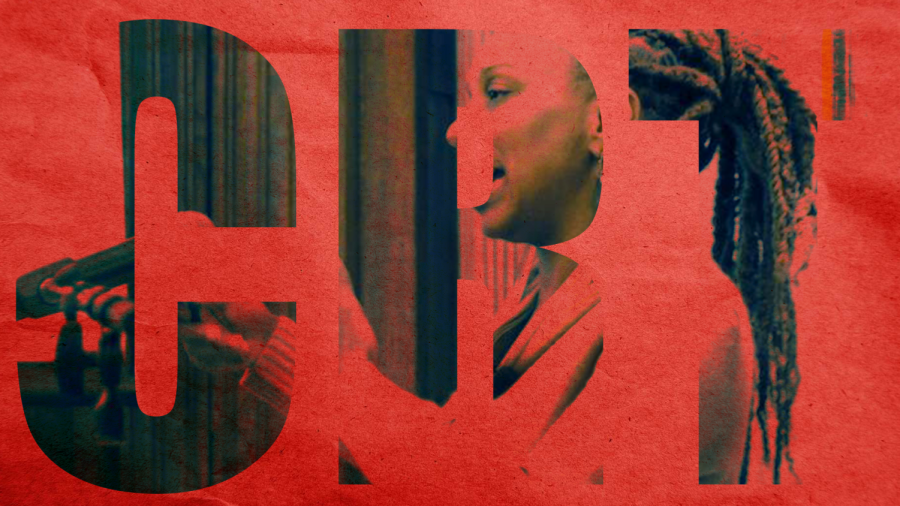Alexander: We Still Need Critical Race Theory
(Graphic by Cyan Larson | The Daily Utah Chronicle)
February 17, 2022
After finding my work with Critical Race Theory, a local Utah high school teacher invited me to discuss the topic with their school’s Black Student Union. Because I support the teaching of CRT, I happily obliged and taught the students what it is and what an average lesson may look like. I answered their questions as best as I could, and it wasn’t a heated or divisive discussion —unlike what Utah Parents United thinks CRT invokes.
Last summer, CRT garnered national attention when conservative media outlets and officials vilified the framework and debated its importance within public schools. Utah lawmakers responded to the nationwide conversation by issuing a resolution against teaching CRT. Following further parent outrage and concern against CRT teachings, Utah’s Board of Education released a set of rules on what teachers can and cannot teach in regards to equity, diversity and inclusion. Now, Utah legislators want to pass a bill that allows Utah parents to withdraw their children from lessons they find objectionable.
Parents who allow their children to opt out of important historical lessons give in to the fear and ignorance opponents of CRT spread. It was only last year when a North Ogden charter school allowed parents to opt their children out of Black History Month teachings and activities. The school only reversed its decision after widespread attention and controversy. However, the opt-out option arose after parents had asked the school’s director for their children’s exemption from Black History teachings. Allowing any parent to modify their child’s lesson or withdraw them from it because they don’t agree with certain teachings is immoral and should not be welcome. If the Utah students I taught can learn and appreciate the importance of CRT, their parents can as well.
I didn’t teach any students to bear responsibility for their ancestors’ actions, nor did I teach that one race was superior or inferior to another. My CRT lecture was a calm, passionate and open discussion about how race operates in American institutions. Both the students and teachers were supportive and active in analyzing CRT’s role in American education, and after hearing how these Utah students felt, their support reinvigorated my own.
I’m not a CRT scholar or researcher, and I don’t study CRT actively. I’m simply a student learning about the world around me. But I have written about CRT many times, including what it is, how to teach it and why I thought Utah’s School Board made a mistake in ruling against CRT. My op-eds helped me better understand the topic, and even landed me a spot on the University of Utah’s Equity, Diversity and Inclusion Panel “Reframing the Conversation.” My participation alongside incredibly insightful professors helped strengthen my opinions of CRT and the importance of inclusive histories.
And like many others, CRT plays an important role in my life in recognizing patterns and practices of institutional racism. For us as a society to confront our nation’s reliance on racism, we need to implement CRT into our high school’s curriculum.
Interestingly enough, the Black Student Union kids I taught agreed with me. After I had given my presentation, the students and I discussed how CRT affected them and why it matters. Their beliefs were strong and passionate, and simultaneously gave me hope and broke me down. What inspired me most, however, was the presence of two white teachers who asked me and the students what they could do moving forward. They asked what they should teach their own friends and family, or how to make others see the patterns and institutional practices of racism. Unfortunately, those were questions I couldn’t fully answer because I didn’t know how.
There’s no concrete answer to how we can teach everyone the importance of inclusivity and equity regarding race. But we can start by teaching CRT in high school curriculum. Our kids don’t have the tools or knowledge to confront patterns of discrimination and racism they see in the world, but teaching CRT can change that. Denying kids the chance to learn about their nation’s transgressions will only prolong our society’s deep-rooted racism.
CRT isn’t divisive, and it shouldn’t make anyone feel lesser than, isolated or horrible about the past. Instead, CRT should teach all students of all colors what racism looks like at the institutional level and at policy level. I want parents opposed to CRT to see the truth and importance of the framework in combating racism today.
Based on my discussions with Utah high school students, parents in Utah and in the United States can learn more about why race matters in our institutions and why allowing racism to prevail in our society’s foundation is detrimental to future generations and mindsets.
Parents should engage with their children and discuss racism actively because of its presence in our lives. But to meaningfully enact change and start heading in a positive direction, we need the help of parents willing to educate their children on the truths of this nation. I know the fight will not be easy, but we cannot move forward until everyone stands united in an effort to rid this country of racism. That can only start through teachings of CRT in high school classrooms.










Corey • Feb 25, 2023 at 4:25 pm
If you are not a CRT scholar or researcher, and do not study CRT actively, how can you write about CRT “many times” about what it is and how to teach it?